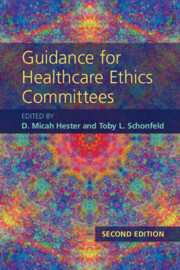Book contents
- Guidance for Healthcare Ethics Committees
- Guidance for Healthcare Ethics Committees
- Copyright page
- Dedication
- Contents
- Contributors
- Preface
- Section 1 The Context of Healthcare Ethics Committee Work
- Section 2 Consultation
- Chapter 7 Ethics Consultation Mission, Vision, Goals, and Process
- Chapter 8 A Method of Consultation
- Chapter 9 Informed Consent
- Chapter 10 Confidentiality and Privacy
- Chapter 11 Decision-Making Capacity
- Chapter 12 Discharge Challenges
- Chapter 13 Surrogate Decision Making
- Chapter 14 Advance Care Planning and End-of-Life Decision-Making
- Chapter 15 Potentially Inappropriate Treatment and Medical Futility
- Chapter 16 Cognitive Dissonance and the Care of Patients with Disorders of Consciousness
- Chapter 17 Ethical Issues in Reproduction
- Chapter 18 Ethical Issues in Neonatology
- Chapter 19 Ethical Issues in Pediatrics
- Chapter 20 Neuroethics
- Chapter 21 Ethical Issues in Clinical Genetics
- Chapter 22 Challenging Issues in Surgical Ethics
- Chapter 23 Psychiatric Ethics
- Section 3 Policy Development and Organizational Issues
- Index
- References
Chapter 23 - Psychiatric Ethics
from Section 2 - Consultation
Published online by Cambridge University Press: 17 February 2022
- Guidance for Healthcare Ethics Committees
- Guidance for Healthcare Ethics Committees
- Copyright page
- Dedication
- Contents
- Contributors
- Preface
- Section 1 The Context of Healthcare Ethics Committee Work
- Section 2 Consultation
- Chapter 7 Ethics Consultation Mission, Vision, Goals, and Process
- Chapter 8 A Method of Consultation
- Chapter 9 Informed Consent
- Chapter 10 Confidentiality and Privacy
- Chapter 11 Decision-Making Capacity
- Chapter 12 Discharge Challenges
- Chapter 13 Surrogate Decision Making
- Chapter 14 Advance Care Planning and End-of-Life Decision-Making
- Chapter 15 Potentially Inappropriate Treatment and Medical Futility
- Chapter 16 Cognitive Dissonance and the Care of Patients with Disorders of Consciousness
- Chapter 17 Ethical Issues in Reproduction
- Chapter 18 Ethical Issues in Neonatology
- Chapter 19 Ethical Issues in Pediatrics
- Chapter 20 Neuroethics
- Chapter 21 Ethical Issues in Clinical Genetics
- Chapter 22 Challenging Issues in Surgical Ethics
- Chapter 23 Psychiatric Ethics
- Section 3 Policy Development and Organizational Issues
- Index
- References
Summary
There are three important reasons that HEC members, especially those who do ethics consultation, need to know about psychiatric ethics. The first is that psychiatric or mental health ethics is a neglected topic in bioethics education, healthcare ethics textbooks, and the training of HECs. When it is taught it is usually peripheral to other issues like confidentiality or a contributing factor to case presentations focused on concerns such as difficult discharges. The second reason this gap in knowledge needs to be addressed is that patients with psychiatric and addictive disorders are commonly encountered in every healthcare environment from outpatient clinics to ICUs. As of 2016 almost 10 million patients on inpatient medical and surgical units suffered from a principal or secondary mental or substance use disorder. Depression, alcohol use disorder, and schizophrenia were the three most frequent diagnoses and often were co-occurring with other chronic medical conditions like diabetes and cardiac disease (Owens et al., 2019).
- Type
- Chapter
- Information
- Guidance for Healthcare Ethics Committees , pp. 199 - 207Publisher: Cambridge University PressPrint publication year: 2022



